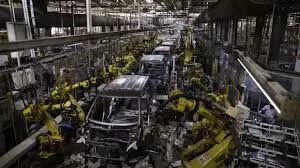Is the Indian Auto Sector Ready for Energy-efficient Manufacturing?

Is the Indian Auto Sector Ready for Energy-efficient Manufacturing?
The automobile industry is a major part of the country’s economy, but using traditional methods can harm the environment. Switching to green solutions like adsorption chillers can change the way the industry works and make it more sustainable.
The Indian auto sector is on a fast lane to growth, emerging as the fourth largest car manufacturer across the globe. The volume production of automobiles stood at 5.5 million in 2022, which took a significant leap in 2023. Clocking a 25.9 million vehicle production in the same year as per the Statista report, the sector is poised to reinforce its positioning in the future.
Looking at the bolstering prospects of the industry, it should be the prerogative of the auto sector to incorporate eco-friendly practices throughout its operations. Given the nature of work, the sector requires a huge amount of energy to power the various processes involved in manufacturing. Simultaneously, it is also responsible for generating a lot of low-grade heat during the various processes such as welding and casting, paint shop, boiler, drying ovens, to name a few operations. The heat released into the air invariably contributes to the greenhouse gas emissions, ultimately having a deteriorating impact on the environment.
To address the unique challenges specific to the sector, the industry players should promote responsible manufacturing. They should lead the front with pioneering solutions to minimize its impact on the environment and drive the efficiency of the sector at the same time. Here, fostering innovation in the form of adsorption chiller technology can play a crucial role in not just driving energy efficiency in the sector but also promoting sustainability at the same time.
Adsorption chillers are proficient at recovering the low-grade waste heat, providing a comprehensive solution to the problem. It achieves the twofold task of meeting the humongous electricity demand required to drive the cooling applications and at the same time taps the abundant low-grade heat that otherwise would have accounted for wasted energy and even resources. The technology facilitating recycling of released heat bodes well for circular energy systems, providing an economical solution to the industry.
The sector fulfills its demand for electricity from burning fossil fuels, which makes up a significant portion of industrial energy consumption. Here, the adsorption chillers come to the rescue and provide energy-smart green cooling solutions where they recover and utilize the low-grade waste heat present in abundance to run the various cooling cycles and air conditioning systems required in manufacturing processes. Mitigating the need for fossil fuel-based electricity, it accounts for curtailing the cooling cost by 99%, thereby playing a crucial role in conserving natural resources.
Additionally, depending on inert Silica Gel for adsorbent and water for refrigerant, further scales up the eco-friendly offering of the technology. The portable water constitutes a green refrigerant, which unlike other alternatives such as chlorofluorocarbons, hydrofluorocarbons, etc. does not cause the depletion of the ozone layer. It is a step ahead in providing holistic sustainable solutions, where it functions in vacuum to avoid making any noise throughout the manufacturing process.
Considering that automobiles are one of the leading industries of the country, if left to operate on conventional processes, it can have a deteriorating effect on the environment. On the contrary, embracing green solutions in the form of adsorption chillers can revolutionize the working of the entire auto industry. While promoting sustainability, it is also beneficial for the sector as it can significantly minimize its operational costs.
(This article is authored by Deepak Pahwa, Chairman, Pahwa Group & Managing Director, Bry-Air)










